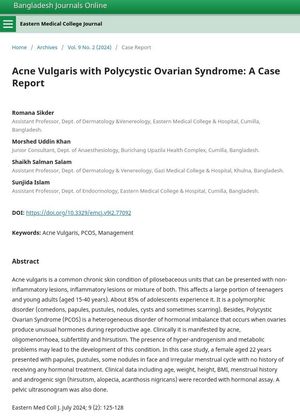TLDR Acne and PCOS are linked due to hormonal imbalances and metabolic issues.
This case report discusses a 22-year-old female patient with acne vulgaris and polycystic ovarian syndrome (PCOS). The patient presented with facial papules, pustules, nodules, and an irregular menstrual cycle, without any prior hormonal treatment. Clinical data such as age, weight, height, BMI, menstrual history, and signs of androgen excess (hirsutism, alopecia, acanthosis nigricans) were collected, alongside a hormonal assay and pelvic ultrasonogram. The report highlights the link between acne and PCOS, emphasizing the hormonal imbalances and metabolic issues associated with the condition.
January 2020 in “Case reports in endocrinology” Removing one ovary helped treat a woman's severe PCOS symptoms when medicine didn't work.
 195 citations
,
November 2019 in “Clinica Chimica Acta”
195 citations
,
November 2019 in “Clinica Chimica Acta” High levels of male hormones, insulin resistance, and obesity are closely linked and worsen polycystic ovary syndrome, but more research is needed to improve treatments.
 43 citations
,
September 2012 in “International Journal of Dermatology”
43 citations
,
September 2012 in “International Journal of Dermatology” Hormonal therapies are safe and effective for treating adult women's acne.
 69 citations
,
November 2010 in “Middle East Fertility Society Journal”
69 citations
,
November 2010 in “Middle East Fertility Society Journal” PCOS affects women's health by increasing the risk of diabetes, heart disease, and reproductive issues.
 118 citations
,
September 2004 in “Clinics in Dermatology”
118 citations
,
September 2004 in “Clinics in Dermatology” Hormones, especially androgens, play a big role in acne, but most acne sufferers don't have a hormone disorder. Hormonal treatments, including birth control pills, can be very effective for women whose acne doesn't improve with regular treatments.
 10 citations
,
June 2010 in “Fertility and Sterility”
10 citations
,
June 2010 in “Fertility and Sterility” Patients with PCOS tend to score their hirsutism higher than clinicians, making self-scoring less useful for diagnosis.






